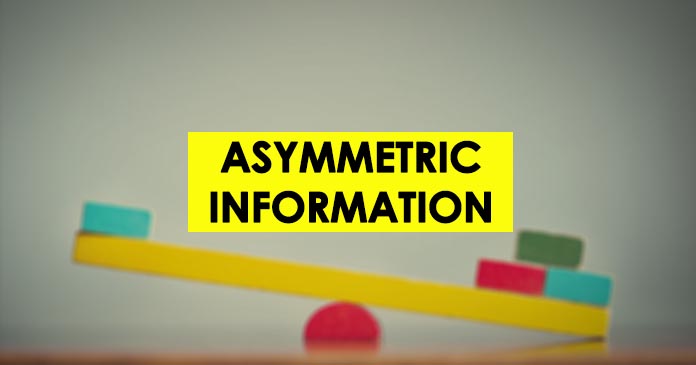Information asymmetric is a difference in access to relevant knowledge. In other words, in asymmetric information, buyers and sellers focus on different transactions or contracts.
The most important feature of information asymmetry is that it causes market failures. In this transaction file is reflexes. Therefore, neither the supplier nor the buyer receives the marginal benefit or the lowest cost. Other effects of asymmetric information include
- Shrinking markets.
- They were disappearing in some markets.
- Loss of efficiency.
- There is inefficiency in the allocation of resources.
- Low-quality products can drive high-quality products out of the market.
The asymmetric information problem generates two types of direct outcomes.
- Adverse selection
- Moral hazard
To learn more about Adverse selection, read the following article.
Asymmetric information example
Homeowners who wish to sell their property typically know more about it than potential buyers. They may be aware of information that the buyer is unaware of until after they buy the home, such as how freezing the house gets in the winter or how noisy the neighbours are. The buyer then thinks they overpaid for the property or would not have purchased it at all if they had known this information earlier.
The importance of asymmetric information
Any transaction in the financial market shows asymmetric information. In this situation, one of the 2 parties has greater knowledge than the other. This makes it possible to decide more smartly.
Asymmetric Information in Health Insurance
In the market for health insurance, asymmetric information problems arise because Health insurance policies always include clauses that only the companies understand. Privacy laws prevent the sellers of health insurance from asking buyers pertinent lifestyle questions.
How to solve asymmetric information problem?
Information accessibility
Information should be made more accessible to consumers. Although it is impossible to give the user all the information, they should have enough to make a well-informed decision.
As a result, in addition to increasing customer happiness, the overall product quality can be improved.
Warranties and guarantees
These advantages offer buyers protection from bad quality goods. It provides them with some product quality assurance. In the case of a problem, the seller offers return/replacement options for a set amount of time.
Taxes and subsidies
When markets are imperfect, government action through policy is reasonably common. For instance, the healthcare industry is not completely competitive because some people can benefit more from the industry than others. Due to their asymmetric information, doctors get a greater advantage, in controlling the health care labour market.
In this case, the government balances gainers and losers or completes the market. Usually, this is accomplished by raising doctor taxes and providing financial assistance to health insurance customers.
Observation and control
All industries having issues with the information gap should be addressed by the government. Companies may experience a range of issues brought on by unlawful profiteers if effective monitoring and control are not in place. For this, the structure and content of the law should be modified. It should be paired with strict monitoring and control procedures.


